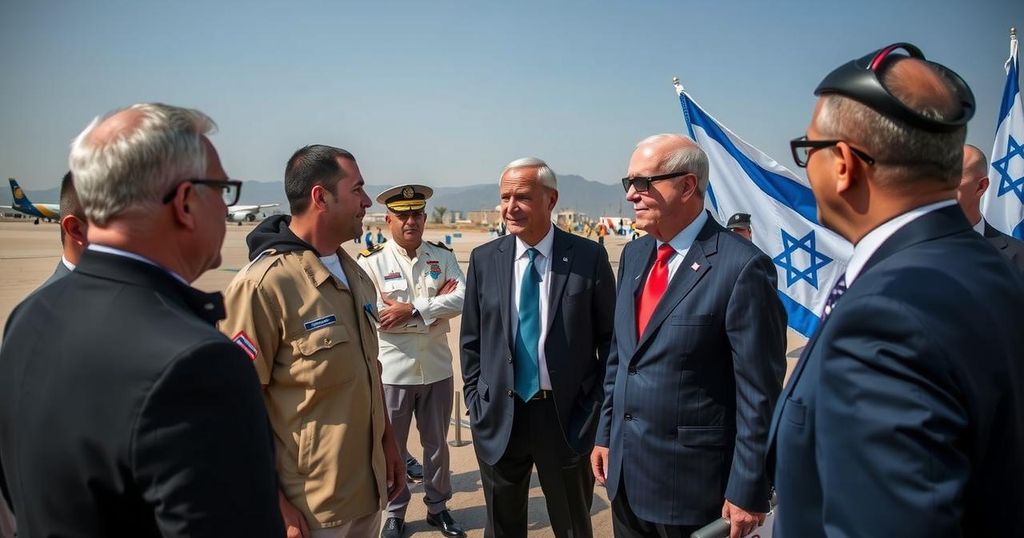Blinken’s Diplomatic Efforts in Israel and Lebanon Amid Ongoing Conflicts
Secretary of State Antony Blinken is visiting Israel to negotiate a Gaza cease-fire and address humanitarian issues while managing tensions with Hezbollah. Meetings are scheduled with Israeli leaders, although prospects for diplomatic breakthroughs appear limited due to significant gaps between opposing parties. Concurrent discussions in Lebanon aim to reinforce resolutions from past conflicts, emphasizing stability in the region.
U.S. Secretary of State Antony Blinken is scheduled to meet with Israeli officials Tuesday as part of his ongoing efforts to resume discussions regarding a cease-fire in Gaza, enhance humanitarian access to the region, and reduce tensions between Israel and Hezbollah in Lebanon. This marks Blinken’s eleventh visit to the area since the outset of the Gaza conflict in October 2023. His agenda includes meetings with Israeli Prime Minister Benjamin Netanyahu and Defense Minister Yoav Gallant. Negotiations mediated by the United States, Egypt, and Qatar have thus far failed to produce a cessation of hostilities or facilitate the release of hostages held by Hamas. A senior official from the State Department indicated that the likelihood of swiftly resuming cease-fire negotiations appears uncertain, especially in light of Israel’s recent elimination of Hamas leader Yahya Sinwar. In addition to his discussions in Israel, Blinken is expected to travel to Jordan on Wednesday. The State Department emphasized that any ongoing dialogues will focus not only on the immediate need for a cease-fire but also on potential governance frameworks for Gaza post-conflict. A State Department official noted that the U.S. has preliminary plans for governance in Gaza that will be shared directly with Israeli representatives. Commenting on the complexities of the situation, Nimrod Goren, an expert in Israeli affairs, conveyed doubt regarding the potential for diplomatic progress during Blinken’s visit. “The gaps are major, basically Israel wants Hamas not to govern Gaza anymore and not to exist in Gaza anymore as a security threat, and Hamas wants the opposite,” he articulated. Furthermore, the State Department expressed concerns regarding the deteriorating humanitarian crisis in northern Gaza. Deputy spokesperson Vedant Patel remarked, “Certainly, nobody in the U.S. government is going to stand in front of you and say that we are satisfied or find the humanitarian situation in any part of Gaza satisfactory.” During his visit, Blinken is expected to advocate for increased humanitarian aid and further cooperation with neighboring countries. On another front, U.S. envoy Amos Hochstein conducted discussions in Beirut, aiming to address the ongoing conflict along the Israel-Lebanon border. Hochstein described his meetings with Lebanese parliamentary leaders as constructive and emphasized the need for both sides to commit to implementing U.N. Security Council Resolution 1701, which seeks to stabilize the region following past hostilities between Israel and Hezbollah. Israel’s primary objective is to push Hezbollah away from border regions, allowing for the safe return of Israeli civilians to northern areas. In the wake of Hamas’s initial attack on October 7, which resulted in the deaths of approximately 1,200 individuals, Hezbollah launched aerial strikes against Israel. Israel’s subsequent military response in Gaza has reportedly led to over 42,600 Palestinian fatalities. Both Hezbollah and Hamas have been classified as terrorist organizations by the United States, United Kingdom, European Union, and several other nations.
The article addresses the intricate dynamics of the ongoing conflict in Gaza and its implications for regional stability, specifically focusing on U.S. diplomatic efforts led by Secretary of State Antony Blinken. The conflict’s escalation since October 2023 has drawn international attention, with various nations, including Egypt and Qatar, attempting to mediate a cease-fire. The humanitarian crisis in Gaza has intensified, necessitating discussions on enhancing aid delivery and post-conflict governance structures. The situation is further complicated by the involvement of militant groups such as Hezbollah, which has engaged in hostilities against Israel, stressing the importance of diplomatic negotiations for long-term peace.
In summary, Secretary of State Antony Blinken’s upcoming visit to Israel seeks to foster dialogue aimed at restoring peace and addressing critical humanitarian needs amid the ongoing conflict in Gaza and rising tensions with Hezbollah. The challenges posed by deep-seated positions of both Israeli and Hamas leaders suggest that advocating for a diplomatic resolution may prove arduous. However, increased humanitarian access and discussions regarding Gaza’s governance in the aftermath of the conflict demonstrate a proactive approach by the U.S. and its allies.
Original Source: www.voanews.com




Post Comment